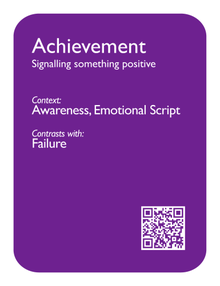Difference between revisions of "Achievement"
ValterAlves (Talk | contribs) m |
ValterAlves (Talk | contribs) m |
||
| (88 intermediate revisions by the same user not shown) | |||
| Line 1: | Line 1: | ||
| − | |||
{{Card | {{Card | ||
| name =Achievement | | name =Achievement | ||
| deckversion =1.0 | | deckversion =1.0 | ||
| − | | | + | | v10synopsis =Signalling something positive |
| + | | v20synopsis =Signalling something positive | ||
| patternpresentation = | | patternpresentation = | ||
| cardpresentation= | | cardpresentation= | ||
| − | | | + | | v10frontface =Achievement-front-v10.png |
| − | | | + | | v10backface =Achievement-back-v10.png |
| + | | v20frontface =Achievement-front-v20.png | ||
| + | | v20backface =Achievement-back-v20.png | ||
| screenshots= | | screenshots= | ||
| − | | | + | | v10rel-tag1=Context:<br> |
| − | | | + | | v10rel1=[[Awareness]], [[Emotional Script]]<br> |
| − | + | | v10rel-tag2=Contrasts with:<br> | |
| − | + | | v10rel2=[[Failure]]<br> | |
| − | <br> | + | | v20rel-tag1=Context:<br> |
| − | | | + | | v20rel1=[[Awareness]], [[Emotional Script]]<br> |
| − | | | + | | v20rel-tag2=Contrasts with:<br> |
| − | + | | v20rel2=[[Failure]]<br> | |
| − | <br> | + | |
| revisions =Introduced in version 1.0 | | revisions =Introduced in version 1.0 | ||
| − | + | | description= | |
| + | [[Achievement]] is arguably the most widely explored use of sound in video games, in all times. It is used to signal virtually all positive happenings during gameplay, such as elemental accomplishments (gathering collectibles, picking power-ups, defeating regular opponents, ...), intermediate success (reaching a checkpoint, unlocking some feature, defeating a boss, ...), collateral achievements (conquering a bonus, earning a trophy, ...), completing the game, etc. | ||
| − | {{ | + | Sounds of [[Achievement]] are, to start with, a matter of [[Awareness]], in the sense that they signal a happening, clarifying its interest. Additionally, they have impact in the overall [[Emotional Script]], in the sense that they reward and highlight the player's behaviour. |
| − | + | ||
| + | Considering the potential recurrence of some [[Achievement]]s along the game experience, they ought to be carefully designed. They are usually short, though the duration may be adapted to the magnitude of the accomplishment. | ||
| + | |||
| + | Since the nature of the [[Achievement]] is often abstract, [[Sound Effects]] or [[Music]] snippets are a common option. In the case of events involving items whose manipulation has an audible [[Foley]] (e.g., picking a sack of coins), a sound derived from it may convey a more direct messaging. Other approaches, including diegetic and non-diegetic [[Dialogue]], have been explored as well. | ||
| + | |||
| + | Perhaps the hardest challenge for a sound designer is to ensure (with a certain level of confidence) that a particular sound stimulus will indeed be perceived as "positive". | ||
| + | |||
| + | Sounds of [[Achievement]] contrast with those of [[Failure]], which convey the opposite semantics. | ||
| + | |||
| + | | examples= | ||
| + | | ex1=<mt p="Achievement" g="Tomb Raider Underworld" w="{{R16by9W}}" h="{{R16by9H}}"></mt> | ||
| + | | ex2=<mt p="Achievement" g="Tetris" w="{{ViPhoneW}}" h="{{ViPhoneH}}">In this implementation (iPhone) a vocal expression "single", "double", "triple", ... is also used.</mt> | ||
| + | | ex3=<mt p="Achievement" g="Ice Age 3" w="{{ViPhoneH}}" h="{{ViPhoneW}}"></mt> | ||
| + | | ex4=<mt p="Achievement" g="Angry Birds" w="{{ViPhoneH}}" h="{{ViPhoneW}}">A case of diegetic interpretation of the success (having the PC celebrating themselves), concluded with a rewarding [[Music]] snippet. </mt> | ||
| + | | ex5=<mt p="Achievement" g="Papa Sangre" w="{{ViPhoneH}}" h="{{ViPhoneW}}"></mt> | ||
| + | | ex6=<mt p="Achievement" g="Patapon" w="{{R16by9W}}" h="{{R16by9H}}"></mt> | ||
| + | | ex7=<mt p="Achievement" g="LocoRoco" w="{{R16by9W}}" h="{{R16by9H}}" i=2></mt> | ||
| + | | ex8=<mt p="Achievement" g="Peggle" w="{{R16by9W}}" h="{{R16by9H}}"></mt> | ||
| + | | ex9=<mt p="Achievement" g="Sonic The Hedgehog" altg="Sonic the Hedgehog" w="{{RPS2W}}" h="{{RPS2H}}"></mt> | ||
| + | | ex10=<mt p="Achievement" g="Aquaria" w="{{R4by3W}}" h="{{R4by3H}}"></mt> | ||
| + | | ex11=<mt p="Achievement" g="The Path" w="{{R32by17W}}" h="{{R32by17H}}"></mt> | ||
| + | | ex12=<mt p="Achievement" g="Spore Origins" w="{{ViPhoneH}}" h="{{ViPhoneW}}"></mt> | ||
| + | }} | ||
Latest revision as of 13:03, 26 July 2012

|

| |
| The card's front face | The card's back face |
Contents
Synopsis
| Signalling something positive. |
Relationships
Context:
Awareness ![]() , Emotional Script
, Emotional Script ![]() .
.
Contrasts with:
Failure ![]() .
.
Description
Achievement is arguably the most widely explored use of sound in video games, in all times. It is used to signal virtually all positive happenings during gameplay, such as elemental accomplishments (gathering collectibles, picking power-ups, defeating regular opponents, ...), intermediate success (reaching a checkpoint, unlocking some feature, defeating a boss, ...), collateral achievements (conquering a bonus, earning a trophy, ...), completing the game, etc.
Sounds of Achievement are, to start with, a matter of Awareness, in the sense that they signal a happening, clarifying its interest. Additionally, they have impact in the overall Emotional Script, in the sense that they reward and highlight the player's behaviour.
Considering the potential recurrence of some Achievements along the game experience, they ought to be carefully designed. They are usually short, though the duration may be adapted to the magnitude of the accomplishment.
Since the nature of the Achievement is often abstract, Sound Effects or Music snippets are a common option. In the case of events involving items whose manipulation has an audible Foley (e.g., picking a sack of coins), a sound derived from it may convey a more direct messaging. Other approaches, including diegetic and non-diegetic Dialogue, have been explored as well.
Perhaps the hardest challenge for a sound designer is to ensure (with a certain level of confidence) that a particular sound stimulus will indeed be perceived as "positive".
Sounds of Achievement contrast with those of Failure, which convey the opposite semantics.
Examples
  Angry Birds: A case of diegetic interpretation of the success (having the PC celebrating themselves), concluded with a rewarding Music snippet.
|










